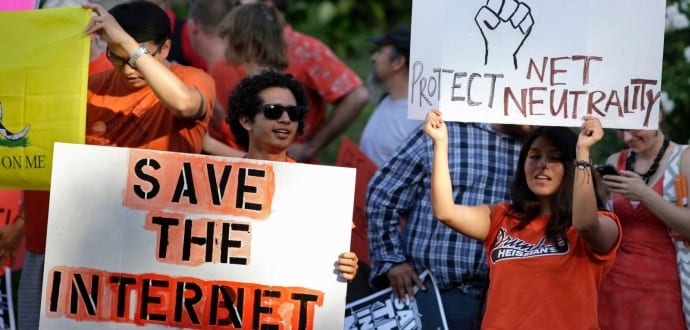U.S. Appeals Court Upholds Net Neutrality Rules In Full
Various public interest groups and free speech activities held victory celebrations when a federal appeals court on Tuesday fully upheld the so-called Open Internet rules, regulations backing the principle of net neutrality.
Net neutrality has been a bone of contention between free Internet advocacy groups and telecom companies ever since the Internet boom in 2000s. The telecom companies want to milk Internet for windfall gains while most activists want that phone and cable companies should treat all of the traffic on their networks equally — no blocking or slowing their competitors, and no fast lanes for companies that can pay more.
Tuesday’s verdict by the The U.S. Court of Appeals for the D.C. Circuit was a clear cut victory for free Internet and Federal Communications Commission as it rejected the petition filed by telecom, cable and wireless industry associations alongside AT&T, CenturyLink and several smaller providers.
FCC had taken a stand that free Internet is absolute and telecom companies were violating basic freed by infringing the Internet for windfall profit. The ruling was celebrated as a victory for consumers by various public interest groups and Internet companies that had supported the FCC in the lawsuit.
However, the fight is far from over. The telecom industry is expected to file an appeal against the ruling in the higher court. Telecom industry has also been lobbying in US congress for favourable legislation so that they can milk Internet for their gains.
“We have always expected this issue to be decided by the Supreme Court, and we look forward to participating in that appeal,” AT&T General Counsel David McAtee said in a statement.
This is the third time in less than a decade that the FCC has had to defend these principles, using various legal frameworks. This very court had twice rejected the FCC’s rules in lawsuits brought by Internet providers.
The net neutrality movement gained momentum after tremendous support from millions of Americans and President Obama himself supported it through public comments. Once President Obama had voice his weight behind total net neutrality, FCC went all in and overhauled the way it regulates broadband Internet by reclassifying it as a more heavily regulated telecommunications service, similar to rules applied to public utilities.
The telecom companies immediately challenged that decision granting FCC complete authority over Internet. They said that they weren’t opposed to the rules themselves but rejected the dramatic expansion of FCC authority over the Internet. They argued that the tighter regulations rooted in a 1934 legal statute would stifle innovation and threaten investment by the industry.
The three-judge panel at the D.C. Circuit Court of Appeals, however, ruled that the FCC did have the proper authority to reclassify broadband Internet under the Title II of the Telecommunications Act. The judges wrote in the opinion:
“The problem in [the previous lawsuit] was not that the Commission had misclassified the service between carriers and edge providers but that the Commission had failed to classify broadband service as a Title II service at all. The Commission overcame this problem in the Order by reclassifying broadband service — and the interconnection arrangements necessary to provide it — as a telecommunications service.”
The wireless carriers had also argued that they should remain shielded from anti-blocking and discrimination rules, given the unique shared nature of their networks. The court, however, ruled that Open Internet regulations should apply to both wired and wireless Internet.”
